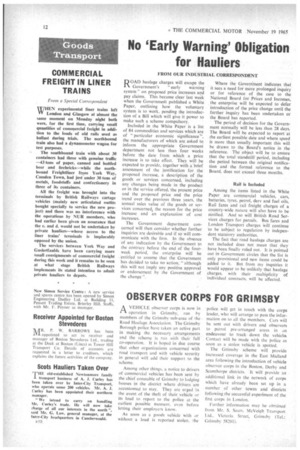No 'Early Warning' Obligation for Hauliers
Page 14

If you've noticed an error in this article please click here to report it so we can fix it.
FROM OUR INDUSTRIAL CORRESPONDENT
ROAD haulage charges will escape the
Government's " early warning system" on proposed price increases and pay claims. This became clear last week when the Government published a White Paper, outlining how the voluntary system is to work, pending the introduction of a Bill which will give it power to make such a scheme compulsory.
Included in the White Paper is a list of 84 commodities and services which are of " particular economic significance'', the manufacturers of which are asked to inform the appropriate Government department not less than four weeks before the date from which a price increase is to take effect. They will be expected to provide, together with a brief assessment of the justification for the proposed increase, a description of the goods or services concerned, including any changes being made in the product or in the service offered. the present price and the proposed price and the price trend over the previous three years, the annual sales value of the goods or services concerned, the reason for the price increase and an explanation of cost increases.
The Government department concerned will then consider whether further inquiries are desirable and if so will communicate with the firm. In the absence of any indication by the Government to the contrary before the end of the fourweek period, the enterprise will be entitled to assume that the Government has decided to take no action, "although this will not imply any positive approval or endorsement by the Government of the change ".
Where the Government indicates that it sees a need for more prolonged inquiry or for reference of the case to the National Board for Prices and Incomes, the enterprise will be expected to defer introduction of the price change until the further inquiry has been undertaken or the Board has reported.
The period of decision for the Government normally will he less than 28 days. The Board will he expected to report at the earliest possible date and where speed is more than usually important this will be drawn to the Board's notice in the reference. The object will be to ensure that the total standstill period, including the period between the original notification and the formal reference to the Board, does not exceed three months.
Rail is Included Among the items listed in the White Paper are commercial vehicles, cars, batteries, tyres. petrol. dery and fuel oils. Rail fares and rail freight charges of a country-wide nature will also have to be nOtified. And so will British Road Services charges for parcels. Bus fares and London Transport charges Will continue to be subject to regulation by independent statutory authorities.
The fact that road haulage charges are not included does not mean that they have been finally ruled out. It is pointed out in Government circles that the list is only provisional and new items could be added to it. But from my inquiries it would appear to be unlikely that haulage charges, with their multiplicity of individual contracts, will be affected.
















































































































































